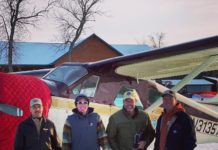The president and CEO of Revival Gold said he and his employees want to hear from people in Central Idaho about their proposed gold mine project to help them “understand what people want.”
During a recent visit to Challis and Salmon, Hugh Agro said it’s important to him and everyone with Revival Gold that the gold project in Lemhi County is supported by locals. He and Pete Blakeley, Revival’s general manager, said Revival has chosen a “measured, controlled way to develop,” the project. In part that’s because the company leases land from the Forest Service for its project and therefore complies with federal regulations. But also because it holds itself to a high standard, Agro said.
“On purpose we are taking a low-profile approach,” Blakeley said. “It’s really important to us that we don’t say things we can’t do.”
Nonetheless, Agro is excited about the potential benefits from the mine, if it opens, and the jobs it can create in Central Idaho.
“It can affect a lot of people in a positive way,” he said. Blakeley is confident the mine could contribute to a strong economy in the region, not only by employing people directly, but by creating auxiliary jobs with companies that provide services to the mine.
“Modern responsible mining requires technology, professional skills, computer and mechanical expertise,” Agro said. Because Revival employees will need specific skills and college degrees, the paychecks they’ll receive will reflect their expertise, he said. Likewise, Revival will need employees who can focus on long-term environmental planning to reclaim the mined areas. Those people will need degrees and backgrounds in biology and sciences, Agro said. Modern, responsible mining includes “putting the land back to other uses,” he said. “Mining is a temporary use to get the most out of the land. Then when we’re done, it goes right back to its previous use.”
“We want to hire Idahoans who are smart and capable,” he said. Last summer, 50 people worked for Revival in Lemhi County as exploratory work was completed.
Current predictions say the Beartrack-Arnett properties in Lemhi County could have a seven-year mining life. As is the case with most mining operations, Agro said Revival personnel will continue to explore the region and look for other possible opportunities for development. Diversification is key to Revival, as it is to all companies, he said.
The question they ask daily, Agro said, is “How do we get the most out of this resource responsibly?” Revival personnel have spent the last three years developing the resource at Beartrack-Arnett, he said, and now it’s time to evaluate the economics. That includes listening to the community and making sure people who live near the project understand it, he said.
A responsible metals industry is vital to Americans, Agro said, for everything from electric vehicles to computers to fly fishing rods to river rafts.
The men are proud to be contemplating a project in Idaho, a state with a long history of mining. “Mining has always been in Idaho,” Agro said, “adding to the prosperity of communities.” The Beartrack-Arnett mine dates back to Idaho’s first governor, George Shoup. Shoup was governor for just two and a half months, from Oct. 1 until Dec. 18, 1890. He was elected to the U.S. Senate during that time, and resigned his post as governor. Shoup worked in mining and merchandising near Pikes Peak, Colorado; what is now Virginia City, Montana; and the Salmon region. He helped found the city of Salmon and helped create Lemhi County.
Agro and other Revival employees have been tracking down descendants of Shoup to gain a better understanding of the region and to purchase land from some of them. That venture included a long chat with Challis resident Pat Clutis, who Agro said shared “great stories” with them.
Credit: Source link






























